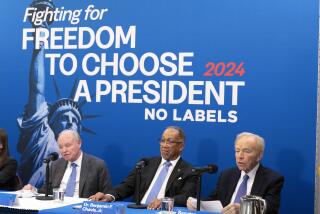Politics, money and taxes
Mention “social welfare organization” and the last thing that comes to mind is a group that expends millions of dollars to influence a federal election. But Crossroads GPS, which spent more than $17 million in 2010 to elect Republicans to Congress, claims to be a social welfare organization — which gives it tax-
exempt status and allows it to conceal the identities of its donors.
Now two campaign-reform groups have written to the Internal Revenue Service challenging the right of Crossroads GPS and three other organizations to 501(c)(4) status. The IRS should initiate an investigation. In the aftermath of the Supreme Court’s Citizens United decision, special interests can spend freely to influence elections; the least the public can expect is that groups such as Crossroads GPS identify who’s providing the money.
Under the tax code, 501(c)(4)s are supposed to be either social welfare organizations or local associations of employees involved in charitable work. Among the examples provided by the IRS are an organization that erects homes for low- and moderate-income families or a group formed to advise individuals on how to solve their financial difficulties. A 501(c)(4) can engage in some political activity so long as it’s not the organization’s principal purpose.
Crossroads GPS and similar organizations insist that they engage in significant social welfare activities in addition to their political activities, though Crossroads includes “issue ads” in that category. But the reform groups scoff at such claims, insisting that the organizations’ overriding purpose is to participate in and influence elections. That is something the IRS should determine.
In addition to Crossroads GPS, the reform groups are asking the IRS to review the status of American Action Network, Americans Elect and Priorities USA, which was founded by two former aides to President Obama. The abuse of the 501(c)(4) exemption is a bipartisan affair.
These groups should be allowed to make their case that they engage in sufficient good works to overshadow their political activities. But if the IRS is not convinced, it should force the groups to reconstitute themselves as so-called 527 organizations — which are allowed to spend in support of candidates but must identify their contributors. Disclosure is also a good work.
More to Read
A cure for the common opinion
Get thought-provoking perspectives with our weekly newsletter.
You may occasionally receive promotional content from the Los Angeles Times.










